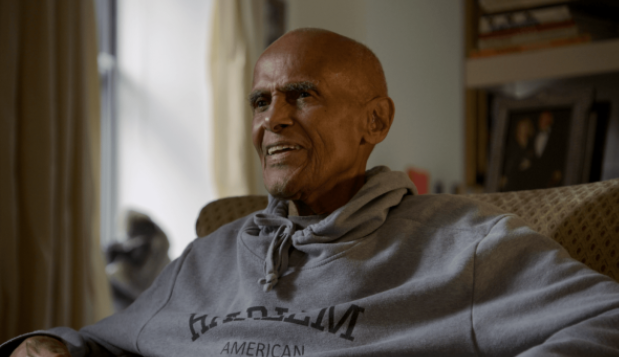-
Posts
2,393 -
Joined
-
Last visited
-
Days Won
91
richardmurray's Achievements
Single Status Update
See all updates by richardmurray
-

‘Is That Black Enough for You?!?’ Review: Elvis Mitchell’s Intoxicating Deep Dive into the Black Cinema Revolution of the ’70s
A critic's movie-love documentary artfully celebrates and deconstructs the decade when African-American audiences, for the first time, could see themselves onscreen.
By Owen Gleiberman
In “Is That Black Enough for You?!?,” Elvis Mitchell’s highly pleasurable and eye-opening movie-love documentary about the American Black cinema revolution of the late ’60s and ’70s, Billy Dee Williams, now 85 but still spry, tells a funny story about what it was like to play Louis McKay, the dapper love object and would-be savior of Billie Holiday in “Lady Sings the Blues.”
The year was 1972, and African-American audiences had rarely (if ever) been given the chance to gawk at a movie star of color who was not just this sexy but this showcased for his sexiness. Louis was like Clark Gable with a dash of Marvin Gaye; when he was on that promenade stairway, Williams says, with a chuckle, that he just about fell in love with himself. That’s how unprecedented the whole thing was. The actor recalls how the lighting was fussed over (we see a shot in which Louis appears bathed in an old-movie glow), and how unreal that was to him on the set. At the time, Black actors didn’t get lighting like that. But Black audiences drank it in with a better-late-than-never swoon, even as they knew that this was a representation they’d been denied for more than half a century.
“Is That Black Enough for You?!?” tells the story of Black film during a singularly creative and unprecedented time — the decade from 1968 to 1978, when Black actors, Black stories, and Black talent behind the camera exploded, in Hollywood and in the adjoining universe of independent film. The actors who came to the fore during this period are legendary: James Earl Jones, Cicely Tyson, Ossie Davis, Diana Ross, Pam Grier, Jim Brown, Tamara Dobson, Max Julien, and many more. The directors, like Gordon Parks and Melvin Van Peebles, were wily and paradigmatic game-changers. And the way that Black talent began to flow through a vast array of forms and genres — action movies, historical dramas, film noirs, musicals, close-to-the-bone indie love stories — made the Black film movement a parallel of the New Hollywood, with new voices overthrowing old strictures.
Mitchell, who wrote, directed, and narrates the film, is a veteran critic who has a unique, at times almost musical ability to nail a film’s unconscious essence. “Is That Black Enough for You?!?” is subtitled “How one decade changed the movies (and me),” and it’s very much Mitchell’s statement about what the rise of Black cinema meant to him, as a Black moviegoer born into a world where movies were still an engine of racial division. His pithy evocation of each movie — the history, the fantasy, the meaning — turns the documentary into a film fanatic’s diary that never tries to separate the importance of these movies from how each of them made him feel. As a critic-turned-filmmaker, Mitchell puts his soul right out there. His conceit is that the very existence of these movies was life-changing, because African-American moviegoers, at long last, had the catharsis of a big-screen mirror. For the first time, they could see themselves onscreen — not degraded or reductive images of themselves, but a reflection of who they were.
The beauty of the documentary is that Mitchell invites the audience to share in the transformational quality — the life force — that he experienced in Black cinema. “My grandmother,” recalls Mitchell, “told me that movies changed the way she dreamed.” That’s as perfect a summation of the power of movies as I’ve ever heard. Movies change our dreams; they change us. But who, in that formulation, gets to be the “us”?
From the start of the 20th century, white audiences could go to the movies and see themselves. Mitchell, born in 1958, grew up in the Detroit area, where he saw the tumult of the inner-city riot/insurrections of the ’60s, but where he also went to the movies to discover who he was and who he wanted to be. Early on, he takes us back to the studio-system days, where Black actors were reduced to playing hideous racist caricatures. His survey of those images — the servility of Stepin Fetchit, the odd-child-out surrealism of Buckwheat, the shocking minstrel moments that could creep into even a movie by Hitchcock — is searing, not only because of the violence of the racism that defined those roles, but because part of the racism lay in what was not being depicted: Black people in their humanity.
We know that Sidney Poitier was the actor who tore down that wall. But Mitchell, while paying due homage to Poitier’s electric intensity, focuses on another Black actor of the period — the outrageously gifted and charismatic Harry Belafonte, the Calypso singer who’d become a screen actor, appearing opposite Dorothy Dandridge in films like “Carmen Jones” (1954), but who abandoned the movies after the remarkable but mostly ignored film noir “Odds Against Tomorrow” (1959), because he couldn’t accept the roles that he was being offered. He didn’t want to be a compromised, patronized, back-of-the-bus movie star; he wanted the whole thing or nothing. Mitchell presents Belafonte as a great actor who became, for a decade, a kind of vanished specter of the star he might have been in a better world.
And then, even with those odds against tomorrow, that world began to come into being.
If you say a phrase like “the Black films of the ’70s,” the first thing that will pop into a lot of people’s heads is the word Blaxploitation. But apart from the reductive and problematic quality of that word, it simply doesn’t do justice to the astonishing range of movies that made up the Black film renaissance. Many, though far from all of them, were written and directed by white filmmakers, yet even as whites continued to commandeer the means of production, these movies became an authentic showcase for the Black experience through the existential expressiveness of the Black actors who starred in them. What those actors had, according to Mitchell, was “the self-possession that would become the core of Black film,” a quality that “created a warrior class where there hadn’t been one before.”
Liberating the films from their too-easy-to-slot-in categories, Mitchell feeds on the eclectic cornucopia of what a “Black movie,” starting in the late ’60s, could be. He explores the emotional transcendence of “Sounder” (1972). The exhilarating, dread-soaked hustler authenticity of “Super Fly” (1972). The performance of Rupert Crosse, the first Black actor to be Oscar-nominated for best supporting actor, in “The Reivers” (1969), where he sparred teasingly with Steve McQueen in a way that subverted racial power dynamics. The conspiratorial paranoia of “Three the Hard Way” (1974), about a serum dumped into the water in Black cities, which the teenage Mitchell thought was funny until his father told him about the Tuskegee Experiment. The jocular knowingness of “Cotton Comes to Harlem” (1971), with its wryly repeated catch phrase “Is that black enough for you?”
And then there’s the deliverance of the opening credits of “Shaft” (1971), a vérité epiphany in which the camera, accompanied by the snaky imperiousness of Isaac Hayes’s theme song, didn’t just follow Richard Roundtree as he walked through Times Square but worshipped him. The rebel-blues-meets-burn-baby-burn mythology of “Sweet Sweetback’s Baadasssss Song” (1971). The “early, all-out glam shower” that was “Lady Sings the Blues.” The way Duane Jones, playing the Black hero of “Night of the Living Dead” (1968), goes through the entire movie without his race being mentioned — and then, after saving the white people, gets paid back by being gunned down. The jaunty self-mockery of Poitier in “Uptown Saturday Night” (1974). The melancholy of William Marshall in “Blacula” (1972). The cowboy effrontery — and haunting commercial failure — of “Buck and the Preacher” (1972). And the clandestine complexity of “Coffy” (1973), in which Pam Grier played a woman bent on vengeance whose every lethal move is weighed down by the gravity of responsibility that’s tearing her in several directions.
“Is That Black Enough for You?!?” is built in a formally simple yet elegant kaleidoscopic way, examining one movie after another but looking at each through a different lens. Here’s how Ron O’Neal jumped a chain-link fence in “Super Fly” and why it mattered, here’s Diahann Carroll’s “core of calm” in “Claudine” (1974), here’s why “The Wiz” (1978), which should have been a crowning achievement of the Black film renaissance, turned out to be its swan song. And Mitchell never stops weaving the past — Hollywood’s and his own — into the narrative, so that we see how this era was anticipated by the career of Oscar Micheaux (who from 1919 to 1948 made 44 features), and how Isaac Hayes’ performance at the 1972 Academy Awards was, for Mitchell, as profound and transporting as any of the films he talks about.
Elvis Mitchell celebrates the moment when Black people, for the first time in movie history, had a popular culture of heroes to respond to. Which gave life, of course, to the heroism within themselves. But even as Hollywood, for the first half of the century, was defined as a place of cinematic apartheid, Mitchell argues against the glib and easy liberal separatism that would sanctify Black cinema — or Black moviegoing — as a hermetic experience. He interviews a host of Black artists, like Belafonte and Laurence Fishburne and Whoopi Goldberg and Samuel L. Jackson and the director Charles Burnett, many of whom testify to the mythology they embraced in old Westerns. They felt discriminated against but not shut out; those “white” movies were for them as well.
And Mitchell offers a head-spinning insight when he talks about the place in the larger movie cosmos that Black cinema came to occupy. During the ’70s, the American hero had gone underground, replaced by the disaffected antihero. Mitchell makes the case that Black cinema brought the hero back. “Audiences of all races came to see these movies,” he says, “because they could feel the adrenaline in the actors.” He also argues that the way Black filmmakers interwove the aesthetics of movies and pop music, down to the bold marketing idea of releasing a soundtrack prior to the movie (a tactic Van Peebles innovated with “Sweetback,” and was then repeated with such seismic soundtracks as Curtis Mayfield’s music for “Super Fly”), paved the way for the fusion of those two industries. “Saturday Night Fever,” in Mitchell’s view, was one culmination of the Black cinema renaissance, with John Travolta appropriating Black nihilistic swagger and the movie selling itself in the spirit of Black movie/music synergy. The ultimate message of “Is That Black Enough for You?!?” is that Black cinema, for all the racism of Hollywood (and America), was never separate from the cinema that wasn’t Black. How could it be? They shared the same dream space.
ARTICLE
https://variety.com/2022/film/reviews/is-that-black-enough-for-you-review-elvis-mitchell-1235396637/
P.S.
Blackwood introduction
https://aalbc.com/tc/profile/6477-richardmurray/?status=1837&type=status
Carib Gold
https://aalbc.com/tc/profile/6477-richardmurray/?status=1860&type=status
South Side Home Movie Project
https://aalbc.com/tc/profile/6477-richardmurray/?status=1882&type=statusYemenyah+ Storm and Rain the movie
https://aalbc.com/tc/profile/6477-richardmurray/?status=1981&type=statusWhy merit doesn't work and the need for communal zones of opportunity in media
https://aalbc.com/tc/profile/6477-richardmurray/?status=2006&type=statusBLACKWOOD discussions




.thumb.jpg.afc88dfee9cd2927de0c440601caac13.jpg)



.thumb.jpg.ed52910791d00308abb8c218695bec88.jpg)
